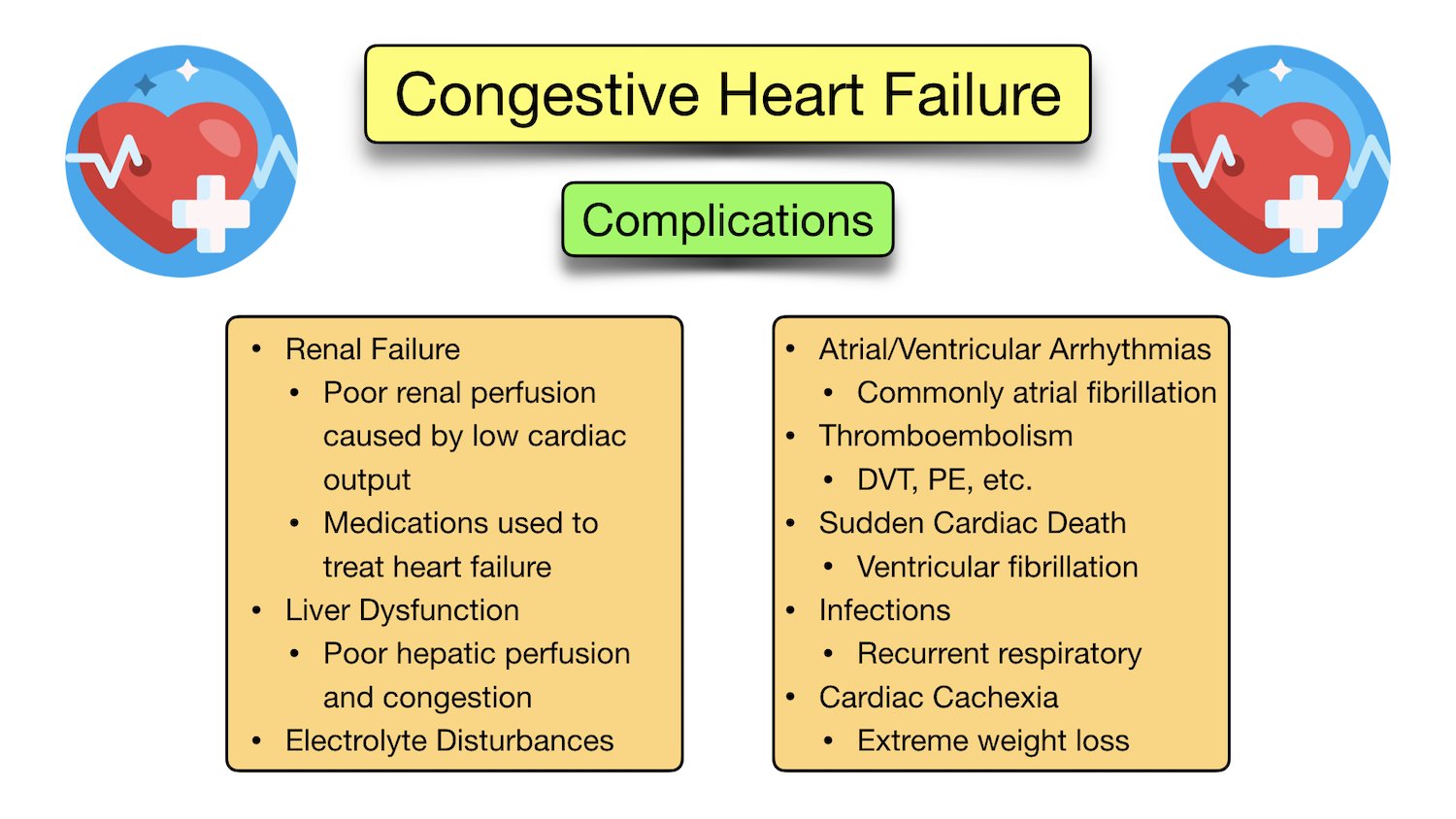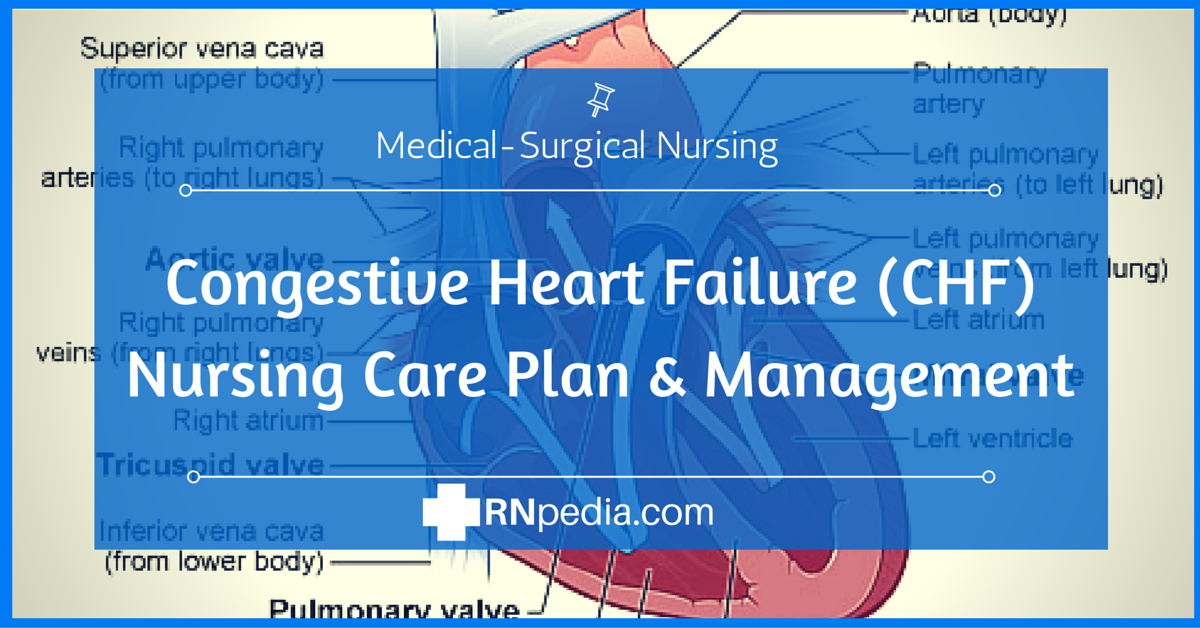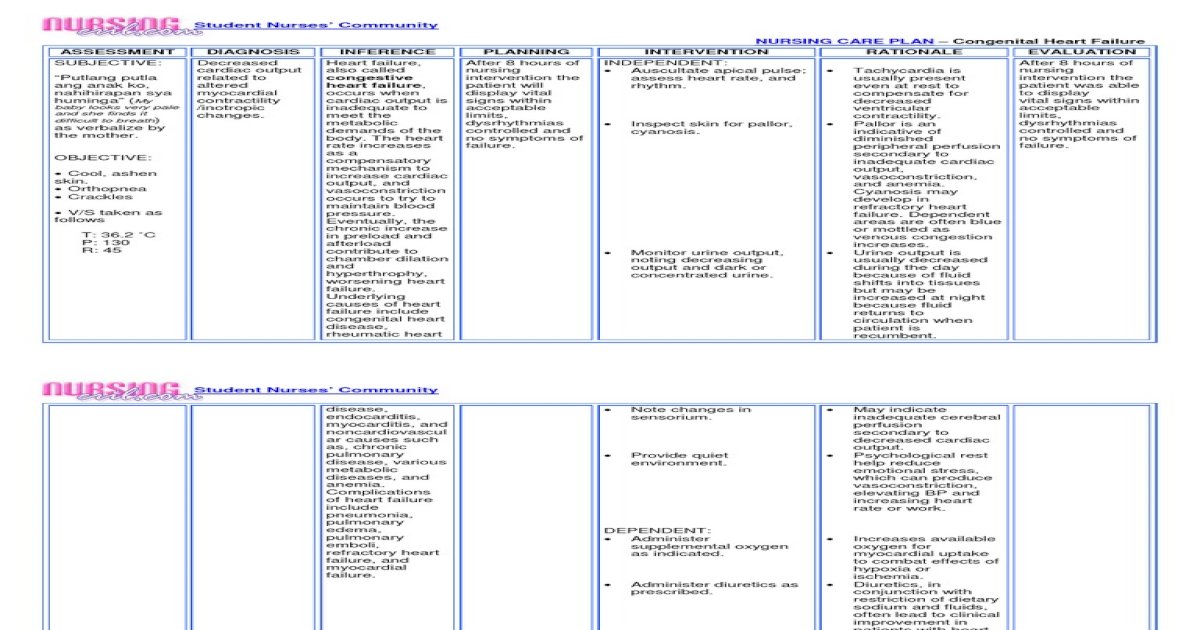
congestive_heart_failure_differential_diagnosis_map Nursing notes
Most patients with heart failure have symptoms due to impaired left ventricular myocardial function. Patients usually present with dyspnea, fatigue, decreased exercise tolerance, and fluid retention, seen as pulmonary and peripheral edema. [1]

18 Nursing Diagnosis for Heart Failure Nursing Care Plans Nursing
Abstract. In Brief. Heart failure (HF) is a chronic syndrome that requires patients to manage signs and symptoms and adhere to a complex medication regimen. This article discusses updates in HF care related to a universal definition and new therapies, focusing on the four pillars of therapy for HF with reduced ejection fraction.

NCP 60 Nursing Care Plan on Congestive Heart Failure/CHF/Cardiovascular
Congenital heart defects. Faulty heart chambers or valves at birth can directly affect the functionality of the heart. Other heart conditions. Viral infections such as COVID-19 may cause inflammation of the cardiac muscles known as myocarditis.

18 Nursing Diagnosis for Heart Failure Nursing Care Plans Nursing
Updated on May 19, 2022 By Marianne Belleza, R.N. Learn about the nursing care management of patients with heart failure. What is Heart Failure? Heart failure, also known as congestive heart failure, is recognized as a clinical syndrome characterized by signs and symptoms of fluid overload or of inadequate tissue perfusion.

Congestive Heart Failure Symptoms, Stages, Treatment, Diagnosis
Congestive heart failure (CHF), as defined by the American College of Cardiology (ACC) and the American Heart Association (AHA), is "a complex clinical syndrome that results from any structural or functional impairment of ventricular filling or ejection of blood."

Congestive Heart Failure (CHF) Nursing Care Plan & Management
Introduction. Heart failure is a common and complex clinical syndrome that results from any functional or structural heart disorder, impairing ventricular filling or ejection of blood to the systemic circulation to meet the body's needs. Heart failure can be caused by several different diseases. Most patients with heart failure have symptoms.

Care Plan For Congestive Heart Failure
Diagnosis. To diagnose heart failure, your health care provider examines you and asks questions about your symptoms and medical history. Your provider checks to see if you have risk factors for heart failure, such as high blood pressure, coronary artery disease or diabetes. Your care provider listens to your lungs and heart with a device called.

Diagnosis of heart failure in primary care Heart
Written by Maegan Wagner, BSN, RN, CCM Heart failure (HF), sometimes referred to as Congestive Heart Failure (CHF), occurs when the heart can't supply blood effectively to the rest of the body. The left ventricle of the heart is larger and is responsible for most of the pumping action.

Heart Failure Nursing Care Management A Study Guide
Objective: to develop an ICNP® terminology subset for the care of people with heart failure. Methods: this is a methodological study, which used the theoretical framework of the Mid-Range Nursing.

Congestive Heart Failure infograph CLICK to enlarge picture for better
Lets take a look at a concept map for congestive heart failure or CHF! So in this lesson we will take a look at the components of a concept map including contributing factors, medications, lab work and the significance, patient education, and associated nursing diagnoses with interventions and evaluations! Ok so here is a basic example of a.

Ncp Congestive Heart Failure Heart Failure Heart
Outline Objective for Congestive Heart Failure (CHF) What is Congestive Heart Failure? Imagine your heart is like a pump in a garden watering system. In Congestive Heart Failure, this pump isn't working as well as it should. It doesn't mean the heart has stopped working, but it's struggling to pump blood efficiently.

Congestive Heart Failure CHF Nursing Diagnosis Care Plan
Congestive heart failure causes substantial patient morbidity and mortality in the United States. Symptoms and physical findings can be helpful in diagnosis but have limited sensitivity and specificity. Objective measurement of ventricular function is essential in virtually all patients in whom a diagnosis of heart failure is suspected. Reversible causes of heart failure must be sought.

Congestive Heart Failure (NCP) Nursing Care Plan for CONGESTIVE HEART
This page contains the complete congestive heart failure nursing lecture e.g. (definition, pathophysiology,& more) ,nursing exam and nursing care plan.

Nursing Care Plan Congestive Heart Failure Heart
Key Roles for the Nurses in Acute Heart Failure Management. Rapid triage to appropriate environment for safe clinical care: coronary care unit, cardiology ward, general medical ward. Objective monitoring for change in signs and symptoms suggestive of response to treatment. Promptly identify and address relevant changes in clinical status.

Figure 1 from Clinical care for the patient with heart failure a
To accomplish this aim, 53 terms were identified in the focus axis of the International Classification for Nursing Practice (ICNP®), which guided the construction of these statements using the guidelines of the International Council of Nurses and ISO 18. 104.

Nursing Care Plan Congestive Heart Failure [PDF Document]
1. Initiating Interventions for Decrease in Cardiac Output 2. Monitoring Diagnostic Procedures and Laboratory Studies 3. Administering Medication and Providing Pharmacological Interventions 4. Maintaining or Improving Respiratory Function 5. Managing Fluid Volume and Electrolyte Imbalance 6. Providing Perioperative Nursing Care 7.